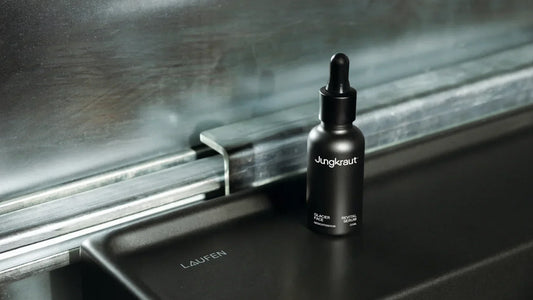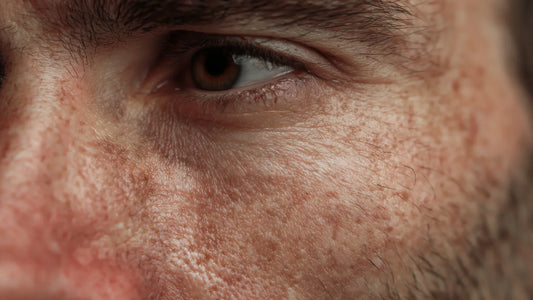
Why does my skin need different care in winter?
Even though winter will soon be over and a more "skin-friendly" season is on its way, in this blog post we would like to briefly address the problems of the cold season in our latitudes. Because one thing is certain: the next winter is sure to come.
Winter stress for the skin
You have probably noticed more than once that your skin - not just on your face - is itchier, more prone to blemishes or at least generally drier in winter. The following factors are mainly responsible for this:
- Cold temperatures and low humidity outside
- Heated indoor spaces with partially dry air
- Large temperature differences between outdoors and indoors
In general, our skin is exposed to drier air in winter than during the warmer seasons. For physical reasons, cold air can store less moisture than warm air. The fact that the warm air indoors is also drier than in summer, for example, is due to the effect of the heating and is often exacerbated by comfort ventilation systems, for example. The cold also causes the blood vessels to constrict, as the skin tries to retain internal heat. This reduced blood supply prevents the skin from being adequately supplied with nutrients and oxygen.
At temperatures below 8°, our sebaceous glands also only function to a limited extent and only a few protective lipids are produced. This damages the skin's natural lipid film and the water on the skin's surface evaporates even faster, resulting in additional moisture loss. The large temperature differences between outside and inside put additional strain on the skin. Our skin flora is ultimately affected and the natural barrier function is disrupted and restricted. In addition to an unpleasant, tense and sometimes itchy feeling, this can also result in skin blemishes or small cracks in the skin, e.g. on the hands.
Dos and don'ts of winter skin care
Before you put all sorts of things on your face to moisturise your skin, let's first look at how you can tackle the causes:
Indoors:
Make sure that you can keep the humidity in the rooms where you spend most of your time - i.e. mainly at home and possibly in the office - between 40-50%. You can achieve this with a humidifier and with proper, i.e. shock ventilation. Also, don't overheat the rooms, especially your bedroom. Your skin (including mucous membranes) and your wallet will thank you.
Cleaning your skin:
Do not use hot water for cleaning, but it can be lukewarm. Don't cleanse your skin too often and only use mild cleansers. For your face, you can use our Jungkraut Botanical Power Face Wash, which contains mild surfactants and inulin, a natural probiotic that regulates and maintains your skin flora. Depending on your skin, you should even wash your face more often with lukewarm water and without any facial cleanser.

What about additional skincare?
Here too, it is important to strengthen the natural skin barrier. To do this, the care products should be composed as similarly as possible to our skin. A mixture of natural fats and powerful actives, such as those found in our Alpine Performance Face Fluid, is ideal here.
However, depending on the situation, this may not be enough for your skin - e.g. if you are a really wild man in winter and spend a lot of time outside in the freezing cold, or if you generally suffer from very dry skin. Natural squalane is a good choice here. This is a light oil that is already naturally present in the protective layer of our skin and which you can apply pure to the skin in addition to your face fluid.
If you spend hours in extreme situations, for example in sub-zero temperatures, you can also use Vaseline as an exception to protect your skin. This forms a protective layer and thus effectively reduces the evaporation of moisture, protecting the skin from drying out. However, due to its petroleum-based content, Vaseline is definitely not something we would recommend using every day. For both environmental and health reasons.
As you can see, our skin is under a lot of stress in winter, but good skincare doesn't have to be complicated.



